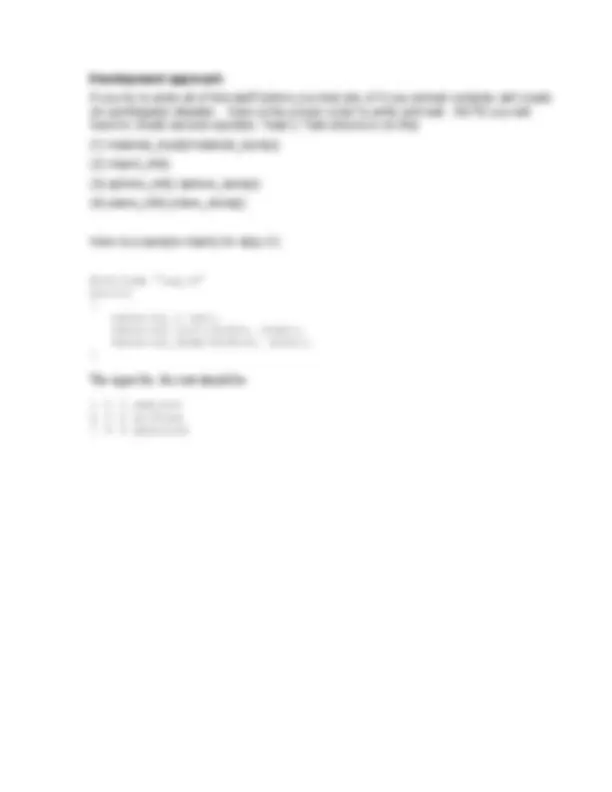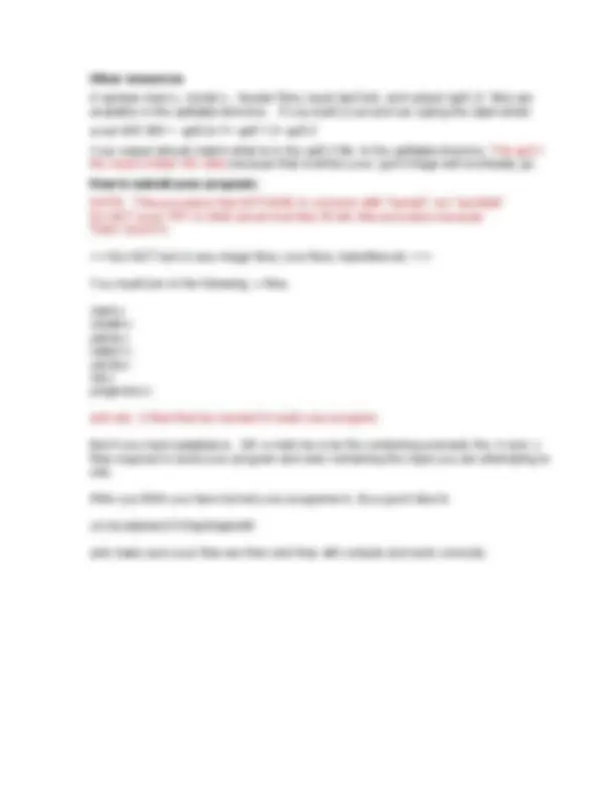




Study with the several resources on Docsity

Earn points by helping other students or get them with a premium plan


Prepare for your exams
Study with the several resources on Docsity

Earn points to download
Earn points by helping other students or get them with a premium plan
Community
Ask the community for help and clear up your study doubts
Discover the best universities in your country according to Docsity users
Free resources
Download our free guides on studying techniques, anxiety management strategies, and thesis advice from Docsity tutors
Material Type: Assignment; Class: SOFTWARE DEV FNDTNS; Subject: COMPUTER SCIENCE; University: Clemson University; Term: Fall 2005;
Typology: Assignments
1 / 4

This page cannot be seen from the preview
Don't miss anything!



Due: Friday, Sep 30 at 11:59 pm Overview In this assignment you will create three four new modules: object.c, sphere.c, plane.c, and material.c. These modules will contain the following functions described below. You must add the proper function prototypes to rayhdrs.h. object.c: /*/ / Constructor for generic object type */ obj_t object_init( FILE in, int objtype); Thes function should malloc() a new obj_t structure, set the objtype and the objid fields and invoke material_init() to read in theambient, diffuse, and specular reflectivity of the object. material.c // int material_init( FILE *in, material_t *mat); This function should use the standard fscanf()/fgets() combination to read reflectivity and consume descriptive text. Because this action is repeated in many contexts. I built a collection of vl_getn() functions that will read 1, 2, or 3 values into a vector. An alternative would be to build a single vl_get() function that could be passed the number of values it is supposed to get. Its also OK to just do it the hard way (call fscanf()/fgets() three times). However, it is REQUIRED that you include some mechanism for detecting defective input and aborting. int sum = 0; sum += vl_get3(in, mat>a mbient); sum += vl_get3(in, mat>d iffuse); sum += vl_get3(in, mat>s pecular); if (sum != 9) { fprintf(stderr, "Matload failed with %d values \n", sum); material_dump(stderr, mat); return( 1); }
void material_dump( FILE out, material_t mat); This module should print a reasonably formatted listing of the material structure. See the example output. sphere.c: // obj_t *sphere_init( FILE *in, int objtype); This function should invoke object_init() to create and initialize the common components of a new obj_t. On succesful return to sphere_init(), a new sphere_t structure should be allocated and the priv pointer of the obj_t structure be set to point to it. Then the location of the center and the radius should be read in. The address of the obj_t should be returned to model init. int sphere_dump( FILE out, obj_t obj); This function should print a reasonably formatted listing of the attributes of a sphere type object. It should use the material_dump() function to print the reflectivity. plane.c: // obj_t *plane_init( FILE *in, int objtype); This should work in a manner analogous to sphere_init() but should read in the plane's normal vector and the coordinates of a single point on the plane. int plane_dump( FILE *out, obj_t *obj); This should work in a manner analogous to sphere_dump().
Other resources A sample main.c, model.c , header files, input (sp5.txt), and output (sp5.2) files are available in the sp5data directory. If you build a.out and run (using the bash shell) a.out 400 300 < sp5.txt 1> sp5.1 2> sp5. Your output should match what is in the sp5.2 file in the sp5data directory. The sp5. file must contain NO data because that is where your .ppm image will eventually go. How to submit your program: NOTE: This procedure has NOTHING in common with "handin" nor "sendlab" Do NOT even TRY to think about how they fit into this procedure because THEY DON'T!! <<<Do NOT turn in any image files, core files, makefiles etc.>>> You must turn in the following .c files: main.c model.c plane.c object.c veclib.c list.c projection.c and any .h files that are needed to build your program. But if you need assistance, DO e-mail me a tar file containing precisely the .h and .c files required to build your program and also containing the input you are attempting to use. After you think you have turned your programs in, its a good idea to cd /local/jmw2/215/sp5/wjsmith and make sure your files are their and they still compile and work correctly.